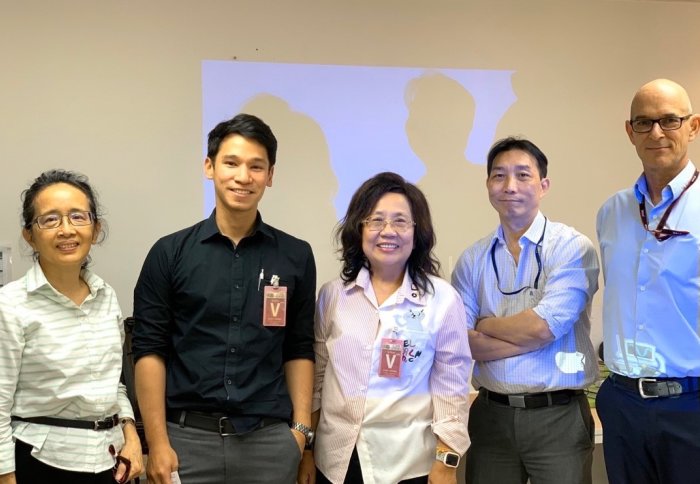PhD student Dr Sangkaew receives awards to investigate dengue in South East Asia

Dr Sangkaew with colleagues at the Armed Forces Research Institute of Medical Sciences, Thailand
A three month research visit was supported by the London Centre of Neglected Infectious Disease Research and a Faculty of Medicine Internship award
Dr Sorawat Sangkaew spent three months on a research visit in Vietnam and Thailand supported by a travel grant from the London Centre of Neglected Infectious Disease Research and funding from the Faculty of Medicine Internship Awards which fund research degree students in a wide range of research and training activities including placements in industry, fieldwork and postdoctoral transitions.
Dr Sangkaew is a second year PhD student who is researching the development of prognostic models for dengue severity that can be used in primary care settings to improve the triage and the clinical management of dengue patients. His area of research focuses on investigating how early signs and symptoms during the febrile phase predict disease progression and the development of severe dengue in South East Asia where dengue is endemic.
Through collaborations that he established with Oxford University Clinical Research Unit (OUCRU) in Ho Chi Minh City, Vietnam, and Queen Sirikit National Institute of Child Health (QSNICH) in Bangkok, Thailand, Dr Sangkaew spent a three month research visit at the respective institutions.
The first part of the research visit took Dr Sangkaew to Ho Chi Minh City, Vietnam. The placement at OUCRU was timed to maximise his exposure to, the key processes of data collection from patients, data analyses, as well as clinical observations in the Hospital for Tropical Diseases in Ho Chi Minh City.
During this placement Dr Sangkaew curated and analysed the data set under the supervision of clinicians on the dengue and biostatistics teams at OUCRU. Preliminary prognostic models based on the Vietnamese data set were presented to the dengue group at OUCRU. The feedback and questions from the discussion helped to strengthen the robustness and validity of the model as it is developed further. Attending patient ward rounds in both paediatric and adult intensive care units was invaluable in Dr Sangkaew gaining insight into current clinical practice and the value research can add to dengue patient management, particularly in the context of low and middle income countries in endemic areas.
By the end of his placement, the prognostic model development with the Vietnamese data set was well underway, with all the data sets required for model development ready for further analyses. Most importantly, the placement allowed Sorawat to strengthen his existing research collaboration with OUCRU, and establish a good working relationship for future work.
Following a two month placement in Vietnam, Dr Sangkaew completed a clinical placement at the QSNICH, Bangkok for a month to gain further perspective on severe dengue case management in a different setting involving a combination of clinical work, data analysis and research.
Ward rounds gave Dr Sangkaew the opportunity for comprehensive discussion and clinical guidance on cases and discuss management with patients under the supervision of dengue experts. Dr Sangkaew saw first hand how his host institute combined new medical evidence with their expertise in managing complicated dengue cases, as not all treatment and management practices have been documented in current guidelines. His experience with the team in Bangkok reinforced the need for research to address gaps in clinical practice and be translatable in thereal world, and he hopes to address this through his research.
Outside of clinical work, his placement at QSNICH also strengthened Sorawat’s research network on dengue in Thailand. He presented his PhD progress at the Armed Forces Research Institute of Medical Sciences (AFRIMS), a research collaboration in Thailand. He also connected with the mathematic modelling group at the Mahidol Oxford Research Unit at Mahidol University.
The three month research placement gave Sorawat an invaluable opportunity to better understand the context, current needs and future use of his prognostic model for the clinical management of dengue patients. Time spent at OUCRU and the QSNICH allowed him to tailor the development of his models so that they can optimise clinical decision support systems and have a real impact on patient management, improving the quality of care in the future.
The placements have strengthened the existing research collaborations with Imperial College and further developed his network with other researchers and clinicians in the field.
Article text (excluding photos or graphics) © Imperial College London.
Photos and graphics subject to third party copyright used with permission or © Imperial College London.
Reporter
Rakhee Parmar
Department of Infectious Disease
Sorawat Sangkaew
Department of Infectious Disease